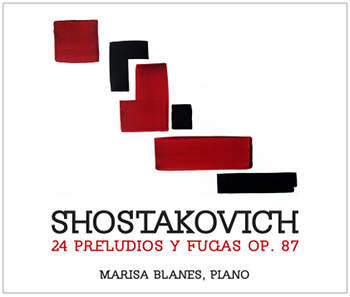“The tonality does not have to be abolished, it can be transcended”
The pianist Marisa Blanes and the actor Manuel Galiana premiered six melólogos of current composers with texts of Santa Teresa de Jesús.
 EXTRACT OF THE INTERVIEW CARRIED OUT BY THE JOURNALIST PABLO J. VAYÓN PUBLISHED IN THE DIARY OF SEVILLE THE PAST OCTOBER 12
EXTRACT OF THE INTERVIEW CARRIED OUT BY THE JOURNALIST PABLO J. VAYÓN PUBLISHED IN THE DIARY OF SEVILLE THE PAST OCTOBER 12
MELÓLOGOS EN HONOR DE SANTA TERESA. Marisa Blanes, piano; Manuel Galiana, recitador. Iberia Classical (Sémele)
The activities surrounding the V Centenary of the birth of Saint Teresa of Jesus, which culminate next Thursday, the 15th, date dedicated to the santoral to this universal, have had the characteristic institutional profile that the great cultural ephemerides in Spain have known for decades. , but that has not limited private contributions. The Directorate General of Politics and Cultural Industries and the Book of the Ministry of Culture organized a series of concerts around the figure of the saint in which was presented last June the project that includes this record from the Granada label Iberia. In it the pianist Marisa Blanes and the actor Manuel Galiana have recorded six works of current composers written from texts of Santa Teresa. The original of the proposal is the recourse to the genre of the melologist, a derivative of the melodrama in which the texts are recited and not sung. For Marisa Blanes it was the ideal way “to include in the project Manuel Galiana, a friend of many years, Manolo is not only a great actor, but someone who enjoys reciting poetry a lot, with him he had already premiered other works”
– How did the idea of dedicating these melólogos to Santa Teresa arise?
-It was the idea of a group of Spanish composers who joined the company Sonic Links, which is the company I have with my husband, Luciano González Sarmiento. Tomás Marco, Carlos Cruz de Castro and José Luis Turina have been friends of ours for a long time, and among all of us we were thinking about this project, which has become increasingly exciting. To all three we add the name of Francisco Novel Sámano, a Cantabrian composer of a more recent generation, and, trying to expand the reach to South America, we also incorporate the Venezuelan Alfredo Rugeles, who is very close to Tomás, and the Mexican Eduardo Soto Millán .
-When does the possibility arise of taking this work to the album and why on the Iberia label?
-From the beginning we thought that it was important to be able to leave testimony of this project, but the certain thing is that to find us with Iberia was a chance and a luck of the life. We were looking for a producer and a record company to publish my work on Shostakovich when we met Paco Moya, the producer of Iberia. He knew my husband a lot, because Luciano was the founding pianist of the Mompou Trio, and everything was phenomenal from the beginning, almost a crush.
– Why contemporary music to honor a mystic of the sixteenth century?
-Contemporary music is as exciting as classical music can be, it has the same parameters of originality and expressiveness. It is true that the usual in these cases is to make music from the time of the honorees, but offer the vision that today’s composers have a great classic I also find an inexcusable task.
-In your opinion, at what point is the Spanish composition?
-In a great moment. We have a generation of magnificent young composers, extraordinarily prepared. In the world of Spanish composition there was a blip after the Civil War, but fortunately that is a stage overcome. Today we have many musicians doing very different things. One of the aspects that I see with more interest is that of a kind of return to tonality. I see it very well. The tonality does not have to be abolished, it can be transcended. Experimentation is important, but to move forward, it is not necessary to liquidate everything behind it. The return of tonality is like a return home.
-Iberia will also publish shortly his recording of a fundamental work of the twentieth century, the 24 Preludes and Fugues by Dmitri Shostakovich. What does this work mean to you?
-I fell in love with this play when I heard it from Tatiana Nikolaieva in Cologne, where I was studying. She went to give a master’s degree, she played it whole and it absolutely impressed me. It is a work of a great internal variety, with a lot of modality, with those typical Shostakovich melodies, which seems to come from the Cossacks … And I realized that you do not play too much. It was four or five years of intense study until I recorded it three years ago. Paco has done an extraordinary remastering job and it will come out very soon. I have done the complete cycle like 7 or 8 times and now I will return to it. It is wonderful. Going back to Shostakovich is for me like going back to meet someone from my family.
Diario de Sevilla, October 12, 2015 – Pablo J. Vayón

